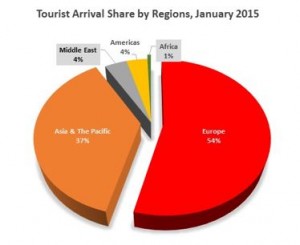Tourist arrivals to the Maldives in January 2015 declined by -7.8 percent compared to the same period last year, the Ministry of Tourism has revealed.
Arrivals in January stood at 97,073 visitors, down from 105,296 visitors in January 2014, according to monthly statistics from the tourism ministry.
“This was the fourth consecutive month where a negative growth was recorded in tourist arrivals to the country,” the ministry observed in a statement last week.
Consequently, the occupancy rate fell from 82.5 percent in January 2014 to 73.9 percent last month.
“However, the average duration of stay remained uniform at January 2014 level with 6.5 days, this however was an increase compared with the 6.1 days at the end of December 2014,” the ministry noted.
In contrast to the negative growth recorded last month, tourist arrivals grew by 18.5 percent in January 2014.
Tourist arrivals also registered negative growth in November (-5.1 percent) and December (-1.2 percent) last year on the back of a steep decline in arrivals from Russia and Western Europe as well as Asia and Pacific markets.
The number of Russian tourists declined by 44.7 percent in December 2014 compared to the same period the previous year.
Arrivals from China and Japan in December meanwhile dropped by 12.2 percent and 11.8 percent respectively.
Last month, industry insiders expressed concern that the Maldives could become an overpriced destination with the introduction of new taxes.
While the Tourism Goods and Services Tax (T-GST) was hiked from 8 to 12 percent in November 2014, the government announced that a US$6 per day ‘green tax’ would be imposed on tourists from November 2015 onward.
“The green tax will definitely have an impact. It is (already) becoming too expensive to go to the top resorts because of all the service charges and taxes,” Shafraz Fazley, managing director of Viluxur Holidays told travel website TTG Asia.
Chinese market
In a phenomenon that caught many industry experts by surprise, the number of Chinese tourists visiting the Maldives tripled from about 100,000 in 2010 to more than 300,000 last year.
In 2014, Chinese tourists accounted for nearly one-third of arrivals with a 30% market share, representing the single biggest source market for tourists to the Maldives.
A total of 363,626 Chinese tourists visited the Maldives in 2014, up 9.6 percent from the previous year, which saw 331,719 arrivals.
However, during 2014, the annual growth rate of Chinese tourist arrivals slowed from 20 percent at the end of June to 9 percent by the end of December.
“Arrivals to the Maldives from China started slowing down during mid-2014 and negative growths were registered since August that year,” the tourism ministry explained.
“January 2015 was recorded as the worst performed month for the Chinese market to the Maldives so far, with a strong negative growth of 33.1 percent. China being the number one market to the Maldives, the negative growth registered from the market was reflected in the total arrivals to the country.”
Meanwhile, according to the tourism ministry’s visitor survey for 2014, less than 10 percent of Chinese tourists were repeat visitors.
In contrast, the survey found that more than 25 percent of British, Italian and German tourists visited the Maldives between two to 10 times.
Europe
 With the decline in arrivals from China, Europe has regained top spot as the largest regional source market for tourists, increasing its market share from 43.9 percent at the end of December to 54.1 percent in January.
With the decline in arrivals from China, Europe has regained top spot as the largest regional source market for tourists, increasing its market share from 43.9 percent at the end of December to 54.1 percent in January.
A total of 52,545 visitors were recorded from European countries, representing a marginal growth rate of 0.5 percent compared to January 2014.
In 2014, the annual growth rate of tourist arrivals from Europe flatlined to 0.4 percent.
However, with Chinese arrivals representing more than a quarter of visitors, total arrivals during the year reached the government’s target of 1.2 million visitors.
In terms of individual markets in January 2015, Italy was the second largest source market with an 8.3 percent market share, followed by the UK with 7.4 percent, Germany with 7.3 percent, and Russia with 6 percent.
However, Russia was the worst performing market during January, the ministry noted, registering negative growth of 38 percent.
Registered establishments
In January, the Maldives had a total of 529 registered tourist facilities with a total bed capacity of 32,087, including 112 resorts (24,151 beds), 19 hotels (1,704 beds), 231 guesthouses (3,397 beds) and 167 safari vessels (2,835 beds), according to the tourism ministry.
However, a total of 302 establishments (27,520 beds) were operational during the month, the ministry revealed.
“Operational capacity included 106 resorts with 23,247 beds, 15 hotels with 1,468 beds, 107 guest houses with 1,569 beds and 74 safari vessels with 1,236 beds,” the ministry’s statistics showed.
“The total tourist bed nights of these operational establishments in January 2015 was 630,840 which was a drop (-7.8%) compared with that of January 2014.”
Related to this story
Maldives’ resorts among the best in the world, but industry insiders express concern over green tax
1.4 million figure for 2014 tourist arrivals incorrect, says tourism minister
Expansion of economic activity in third quarter driven by tourism sector: MMA
 (0)Dislikes
(0)Dislikes (0)
(0)